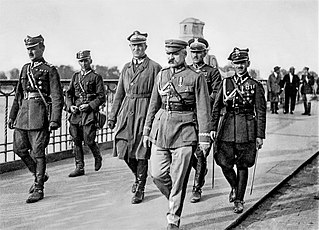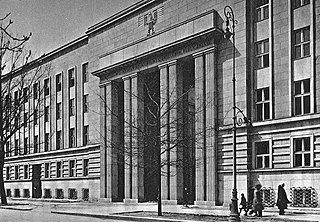You can help expand this article with text translated from the corresponding article in Polish. (January 2024)Click [show] for important translation instructions.
|
You can help expand this article with text translated from the corresponding article in Polish. (January 2024)Click [show] for important translation instructions.
|
| | This section is empty. You can help by adding to it. (July 2010) |
Alternative government-in-exile, created by Juliusz Nowina-Sokolnicki

Stanisław Wojciechowski was a Polish politician and scholar who served as President of Poland between 1922 and 1926, during the Second Polish Republic.

Kazimierz Władysław Bartel was a Polish mathematician, freemason, scholar, diplomat and politician who served as 15th, 17th and 19th Prime Minister of Poland three times between 1926 and 1930 and the Senator of Poland from 1937 until the outbreak of World War II.

The Order of the White Eagle is the highest order of merit of the Republic of Poland and one of the oldest distinctions in the world still in use. It was officially instituted on 1 November 1705 by Augustus II the Strong, King of Poland and Elector of Saxony, and bestowed on eight of his closest diplomatic and political supporters. It has since been awarded to the most distinguished Poles for their merits and to the highest-ranking representatives of foreign countries.

Wincenty Witos was a Polish statesman, prominent member and leader of the Polish People's Party (PSL), who served three times as the Prime Minister of Poland in the 1920s.
The Nonpartisan Bloc for Cooperation with the Government was a "non-political" organization in the interwar Second Polish Republic, in 1928–35. It was closely affiliated with Józef Piłsudski and his Sanation movement. Its major activists included Walery Sławek, Kazimierz Bartel, Kazimierz Świtalski, Aleksander Prystor, Józef Beck, Janusz Jędrzejewicz, Wacław Jędrzejewicz, Adam Koc, Leon Kozłowski, Ignacy Matuszewski, Bogusław Miedziński, Bronisław Pieracki, Adam Skwarczyński, and Janusz Franciszek Radziwiłł.

The May Coup was a coup d'état carried out in Poland by Marshal Józef Piłsudski from 12 to 14 May 1926. The attack of Piłsudski's supporters on government forces resulted in an overthrow of the democratically-elected government of President Stanisław Wojciechowski and Prime Minister Wincenty Witos and caused hundreds of fatalities. A new government was installed, headed by Kazimierz Bartel. Ignacy Mościcki became president. Piłsudski remained the dominant politician in Poland until his death in 1935.

Walery Jan Sławek was a Polish politician, freemason, military officer and activist, who in the early 1930s served three times as Prime Minister of Poland. He was one of the closest aides of Polish leader, Józef Piłsudski.
Romanticism in Poland, a literary, artistic and intellectual period in the evolution of Polish culture, began around 1820, coinciding with the publication of Adam Mickiewicz's first poems in 1822. It ended with the suppression of the January 1863 Uprising against the Russian Empire in 1864. The latter event ushered in a new era in Polish culture known as Positivism.
Deputy Prime Minister of the Republic of Poland is the deputy of the Prime Minister of Poland and member of the Council of Ministers of the Republic of Poland. They can also be one of the Ministers of the Republic of Poland. The Constitution of the Republic does not limit the number of persons who can hold the position of deputy prime minister simultaneously.

The Diocese of Włocławek is a Latin Church ecclesiastical territory or diocese of the Catholic Church in Poland. It is a suffragan in the ecclesiastical province of the Metropolitan Archdiocese of Gniezno. Until the 20th century, it was known as the Diocese of Kujawy.
Encyklopedia Powszechna published by Samuel Orgelbrand in 1859–1868 was one of the first modern Polish encyclopedias.

The Ministry of Religious Affairs and Public Education was a Polish ministry that existed in the years 1918-1939. Following World War II, it was superseded by the Ministry of National Education.